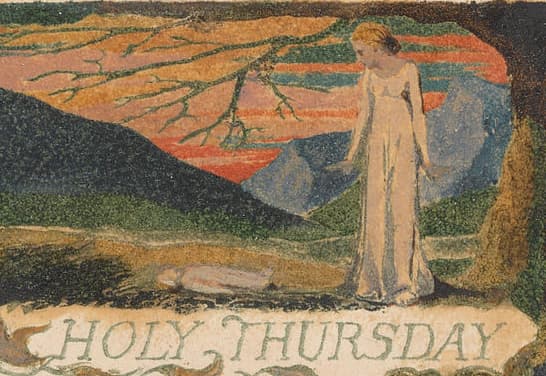Poem of the Day: Two ‘Holy Thursday’ Songs
One of Blake’s opposition-pairings evokes the children of the poorhouses coming to St. Paul’s Cathedral at London as flowers or lambs, their singing of Holy Week hymns rising to heaven.

In 1789, William Blake (1757–1827) published his “Songs of Innocence,” and five years later, in 1794, he produced his “Songs of Experience” — binding them both together as “Songs of Innocence and of Experience Shewing the Two Contrary States of the Human Soul.” Last September, the Sun offered Blake’s “London” as a Poem of the Day, one of the few Songs of Experience without a counterpart among the Songs of Innocence.
A famous opposition-pairing, in “Contrary States,” is Blake’s “The Lamb” matched with “The Tyger.” But the pairing Blake most invites us to examine is the contrary states presented in his two Holy Thursday poems — both set on the day of the Last Supper in Holy Week, the day before Good Friday. In quatrains of 7-foot lines (in truth, a strongly hinted ballad meter of 4 feet and then 3 feet), the Song of Innocence poem pictures the children of the poorhouses coming to St. Paul’s Cathedral at London as flowers or lambs. Their singing of the Holy Week hymns rises to heaven, reminding the listener to “cherish pity, lest you drive an angel from your door.”
Meanwhile, in tetrameter quatrains (the 4-by-4 square stanza that Blake so often employed), the Song of Experience poem for Holy Thursday rages against London’s poverty: “Babes reduced to misery / Fed with cold and usurous hand.” Instead of praising their singing, Blake asks, “Is that trembling cry a song?” And he ends not with the spring that the coming Easter promises but with the cold declaration of “eternal winter” for those children.
Holy Thursday (Songs of Innocence)
by William Blake
’Twas on a Holy Thursday, their innocent faces clean,
The children walking two and two, in red and blue and green,
Grey-headed beadles walk’d before, with wands as white as snow,
Till into the high dome of Paul’s they like Thames’ waters flow.
O what a multitude they seem’d, these flowers of London town!
Seated in companies they sit with radiance all their own.
The hum of multitudes was there, but multitudes of lambs,
Thousands of little boys and girls raising their innocent hands.
Now like a mighty wind they raise to Heaven the voice of song,
Or like harmonious thunderings the seats of Heaven among.
Beneath them sit the aged men, wise guardians of the poor;
Then cherish pity, lest you drive an angel from your door.
Holy Thursday (Songs of Experience)
by William Blake
Is this a holy thing to see
In a rich and fruitful land,
Babes reduced to misery
Fed with cold and usurous hand?
Is that trembling cry a song?
Can it be a song of joy?
And so many children poor?
It is a land of poverty!
And their sun does never shine.
And their fields are bleak & bare.
And their ways are fill’d with thorns.
It is eternal winter there.
For where’er the sun does shine,
And where’er the rain does fall:
Babe can never hunger there,
Nor poverty the mind appall.
___________________________________________
With “Poem of the Day,” The New York Sun offers a daily portion of verse selected by Joseph Bottum with the help of the North Carolina poet Sally Thomas, the Sun’s associate poetry editor. Tied to the day, or the season, or just individual taste, the poems are drawn from the deep traditions of English verse: the great work of the past, together with the living poets who keep those traditions alive. The goal is always to show that poetry can still serve as a delight to the ear, an instruction to the mind, and a tonic for the soul.
